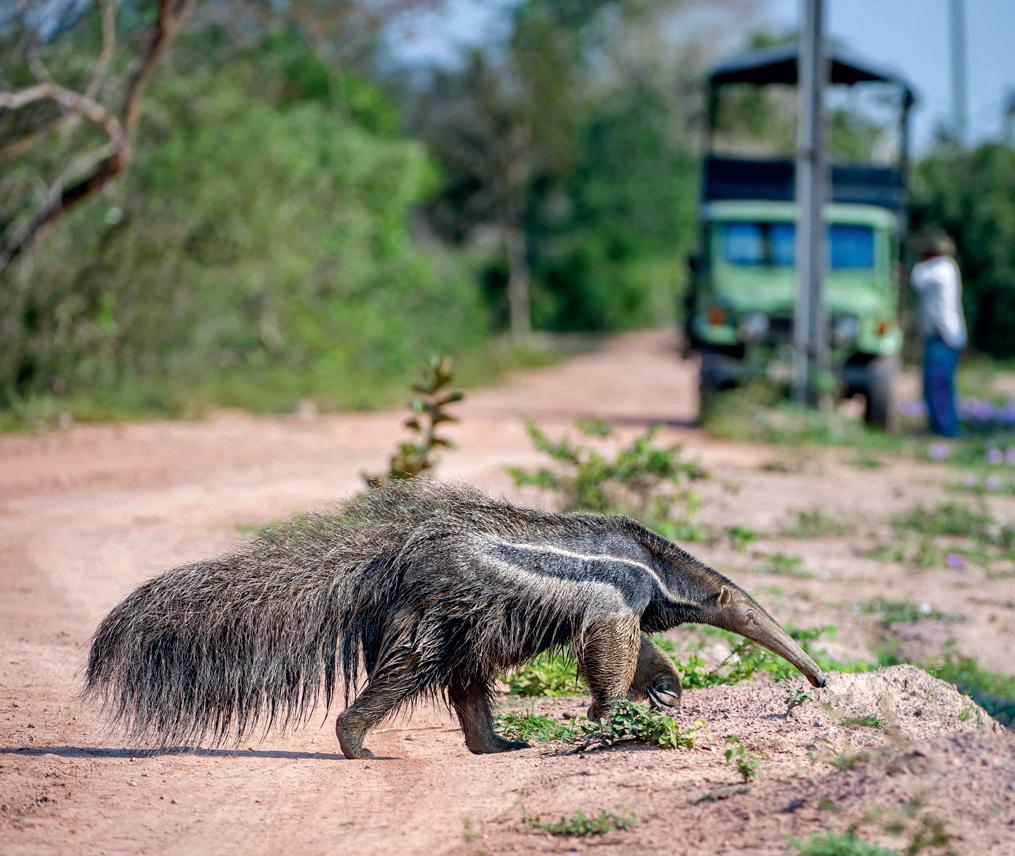
As the evening sky turns violet, the animals of the Pantanal gather near the water. Capybaras swim in tight formation, roseate spoonbills add smudges of pink to the riverbanks, the rumble of a jaguar pulsates from the forest.
This tropical wetland is the world's largest, stretching across Brazil, Paraguay and Bolivia, and hosts some of the greatest gatherings of animals anywhere. Now, scientists say the survival of the entire biome is at risk.
"The Pantanal is like Noah's ark. It is ... a place where those at risk of extinction can survive," said Pierre Girard, a professor at the Federal University of Mato Grosso. "That could be about to change. The Pantanal, as we know it, could soon cease to exist." The 17m hectare wild expanse harbours one of the world's most biologically rich environments, with at least 380 species of fish, 580 types of birds and 2,272 different plants. It is one of the main refuges for jaguars and houses a host of vulnerable and endangered species, including giant river otters, giant armadillos and hyacinth macaws.
But plans are under way to revive a project to turn the Paraguay River, one of the Pantanal's main arteries, into an industrial shipping route for crops such as soya beans and sugar.
Proponents say the waterway would reduce costs and time for exporting agricultural commodities but critics warn that its creation - which involves building new ports, possibly straightening bends and large-scale dredging - would cause irreversible damage to the wetland and wildlife.
"It seems a high price to pay: destroying the Pantanal, one of the world's unique systems, to reduce the price of grain," said Carolina Joana da Silva, a professor at Mato Grosso State University. "It is a war - a war which risks extinction." In a communal fishers' work shed in Cáceres, 64-year-old Elza Basto Pereira, the head of the community, said construction materials began arriving along the river six months ago.
Denne historien er fra August 16, 2024-utgaven av The Guardian Weekly.
Start din 7-dagers gratis prøveperiode på Magzter GOLD for å få tilgang til tusenvis av utvalgte premiumhistorier og 9000+ magasiner og aviser.
Allerede abonnent ? Logg på
Denne historien er fra August 16, 2024-utgaven av The Guardian Weekly.
Start din 7-dagers gratis prøveperiode på Magzter GOLD for å få tilgang til tusenvis av utvalgte premiumhistorier og 9000+ magasiner og aviser.
Allerede abonnent? Logg på

If kids get protected from online harm, how about the rest of us?
The Australian government has proposed a ban on social media for all citizens under 16.

'It's not drought - it's looting'
Spain is increasingly either parched or flooded - and one group is profiting from these extremes: the thirsty multinational companies forcing angry citizens to pay for water in bottles.

Life in the grey Zone
Neonatal care has advanced so far that babies born as early as 21 weeks have survived. But is this type of care always the right thing to do?

Out of tune? Band Aid under fire for Africa tropes as it turns 40
Forty years ago this month, a group of pop stars gathered at a west London studio to record a single that would raise millions, inspire further starry projects, and ultimately change charity fundraising in the UK.

Deaths shine spotlight on risks of drinking on party trail
Vang Vieng is an unlikely party hub. Surrounded by striking limestone mountains and caves in central Laos, it morphed from a small farming town to a hedonistic tourist destination in the early 2000s.

Different strokes My strange and emotional week with an AI pet
Moflin can develop a personality and build a rapport with its owner - and doesn't need food or exercise. But is it comforting or alienating?

Strike zone Waking up to the rising threat of lightning
When the Barbados National Archives, home to one of the world's most significant collections of documents from the transatlantic slave trade, reported in June that it had been struck by lightning, it received sympathy and offers of support locally and internationally.

Cheap pints and sticky carpets: the old-school pub is back
In the Palm Tree pub, east London, barman Alf is taking only cash at the rattling 1960s till.

Brain gain Can a radical tax scheme convince the country's brightest to stay?
In the autumn of 2018, I moved to Lisbon for a month-long course at the Universidade .de Lisboa.

Fear and sympathy in small town divided over asylum camp
A year after anti-immigration riots, a site for asylum seekers faces hostility while some locals try to help new arrivals